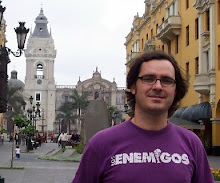While politicians discuss on the need to adopt new international rules to ensure the effective the enforcement of intellectual property right (e.g. ACTA and similar initiatives), this "IP Tanguero" believes that digital technologies do not only facilitate the illegal copy of intellectual creations but also facilitate the dissemination of knowledge and technology transfer. It is my opinion that there are not enough initiatives by public authorities in this direction.
One exception is the project "One Laptop per Child" (OLPC) whose leader is Nicholas Negroponte (MIT Medialab). Basically, the idea of Negroponte is to bring laptops at a reduced price (100 $) to children in less developed countries. In the near future, the laptop will be substituted by a tablet of 70-80 $.
As Negroponte explains in this interview for El Pais (in Spanish), the project is being particularly a success in Latin American countries such as Perú and Uruguay (a review of all OLPC projects in the world in available here). In this countries, there governments are strongly promoting the distribution of these laptops in primary and secondary school and they are organizing seminar to train teachers and students on their use.
From the point of view of Intellectual property, the most interesting aspect of the project is that, as Negroponte says, the laptop work with Linux, an operating system that, as most of the members of our audience know, is released under a free software license, the GPL. This is a great victory of the free software/culture movement and for the dissemination of knowledge. Some Western governments (Spain?) should learn from initiatives like this one and avoid getting everyone lock into proprietary softwares. In any case, I'm not completely sure about Negroponte assertion. Is it really like this? Aren't there OLPC laptops in certain countries that work with Windows?















